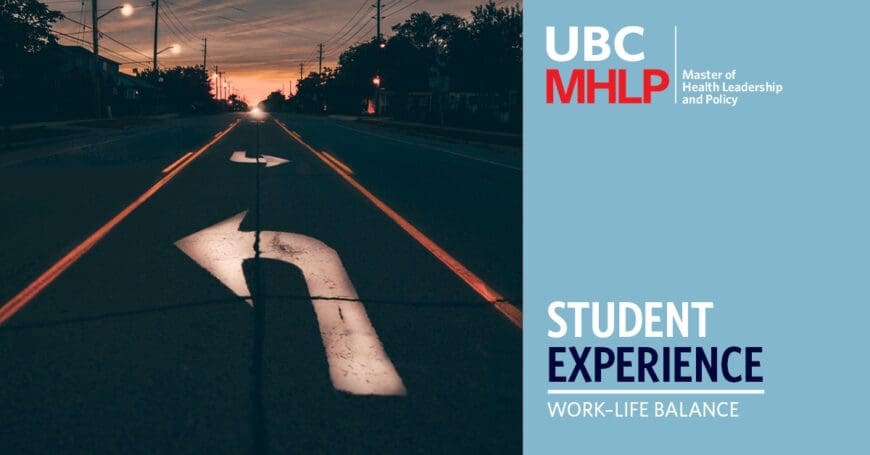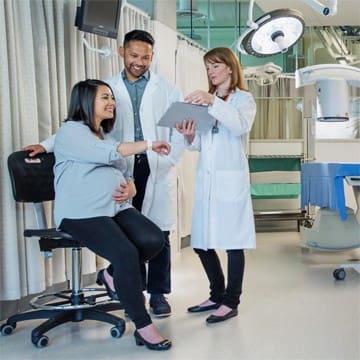Student Experience – Nikko Asistio

What’s it like to be an MHLP student while working full time? And then getting a second job based on your performance during a practicum? We spoke with Nikko Asistio about how he makes it all work.
Why did you decide to pursue the MHLP?
As a healthcare clinician, I have worked in various capacities over the past decade, most recently as a Hospital Supervisor at Peace Arch Hospital. My clinical background is in emergency, but I’ve branched into different areas, including clinical operations management.
I was interested in moving my career in a new direction, and when I heard about the Master of Health Leadership and Policy (MHLP) program in Clinical Education, it seemed like a great opportunity to deepen my exposure to both clinical education and management.
My wife Arlene also influenced my decision. She’s a nursing instructor for BCIT, and we were both wanting to explore other avenues of healthcare. We were on our honeymoon in Africa in November 2018 when we received emails telling us we’d both been accepted into the program.
We were very excited to start yet another chapter together!
What’s been your experience of the program so far?
I’d been on the fence about whether I wanted to do graduate work in clinical education or in business.
The MHLP has given me the opportunity to really understand the business side of health care, and that’s what has intrigued me the most.
I’d worked as an interim manager in the past, and faced certain challenges as I didn’t have an educational background in management. Now that I’ve been exposed to change management practices, finance and accounting, I’m much more confident in my business and leadership skills.
Tell us about your practicum experience.
My passion in health care lies in critical care areas, particularly the emergency department.
Working in the frontline, as well as managing an ER, I recognized that there are insufficiencies and operational processes that can be improved upon. I really wanted to focus my work around something that could benefit my current home site, Peace Arch Hospital. I connected with the Executive Director of the Emergency Network for Fraser Health Authority to see if there were any opportunities for me to join in any current or new projects.
Coincidentally, a few days after starting my practicum, an opportunity opened up for a Clinical Project Lead position for the ER redevelopment at Peace Arch Hospital. I reached out to the project team and informed them of the work that I was doing in my practicum, and a few days later, I was awarded the position.
My practicum has been a great experience, with everything I’ve learned in the MHLP contributing to the work I’m currently doing.
You’ve worked full time throughout the year. How do you juggle going to school, working full time and now taking on this new position?
I’ve worked as a hospital supervisor for the past four years and continued to work full time while going to school. I work evenings on the days when I have classes and then do more evening shifts or work weekends for the remainder of the week. My manager has been very supportive in accommodating my school schedule. It’s also helped that the MHLP classes are concentrated to two days a week.
I hadn’t intended to take on a second position, but the opportunities in this new job were too good to refuse. The position is also very flexible and I can schedule the work in on my terms in-between my hospital supervisor job and school.
It really is a matter of time management and prioritizing your work effectively and efficiently.
How do you make this all work?
It’s certainly been challenging and stressful at times. Having a flexible work schedule has helped. And I’ve adapted as needed.
During the three-week business boot camp in August, Arlene and I had to be on campus five days a week, so we rented a place in Vancouver for that period to avoid the daily commute from White Rock (which sometimes could take up to 90 minutes one way).
Kathy O’Flynn-Magee taught the Theoretical Foundations of Clinical Education course in the first semester, and she always reminded us of the importance of mindfulness and self-care. That was not something I was good at before her class. But it’s made such a difference and helped me make that healthy disconnect from school and work.
Having Arlene as a classmate has also been great. If we’re not on campus or at work, we’re studying in a coffee shop somewhere. It’s been a huge support to have her in the program as we help each other.
Anything else about the program you’d like to share?
The business and leadership classes bring together students from both the MHLP and Master of Engineering Leadership (MEL) programs. That’s been an amazing experience – learning alongside people with very different life experiences and industry backgrounds, and being exposed to the world of engineering.
I’ve developed close friendships with some of the other students that I am sure will last for years to come.
What’s your favourite place to study on campus?
The studio in the McGavin Building has been a great place to network and connect with the other students. A lot of group meetings occur there, as there is a lot of space, tables and moveable drawing boards.
Another great location is the Graduate Student Society area in the Nest. Similar to the studio, it’s a great location for groups to discuss their assignments, plus it’s close to a vast selection of food.
Any advice for quickly developing a sense of community?
As a mature student, it can be daunting to re-enter the education world. Some haven’t laid foot in a classroom in over a decade.
Know that you, and all the students in that classroom, are aiming for the same goal: to develop your skills as a leader.
Take yourself out of the comfort zone and learn about the other students’ stories that encouraged them to pursue their master’s degrees.
Take advantage of any extracurricular activities that are organized: the relationships you develop with your colleagues are priceless and having a support group throughout the program is tremendously helpful.
Finally, what’s next?
So many opportunities have emerged from this program. I’ll see where the new clinical project lead position takes me after I graduate.
Now that I have a greater knowledge towards the foundational concepts of operations management, I foresee myself continuing to pursue positions in this field.
Clinical Education
Develop the educational strategies and leadership skills to create caring, collaborative clinical environments.
Read MoreApplication Deadlines
Get ready to apply!
Admissions for the 2026 intake will open on January 1, 2025.
How to ApplyAssess your Eligibility
Determine if your professional experience and academic background make you a fit for your desired program.
Start AssessmentJoin us for an
Info Session
Sign up for our latest online information sessions and discover what our programs have to offer.
Sign Up Now